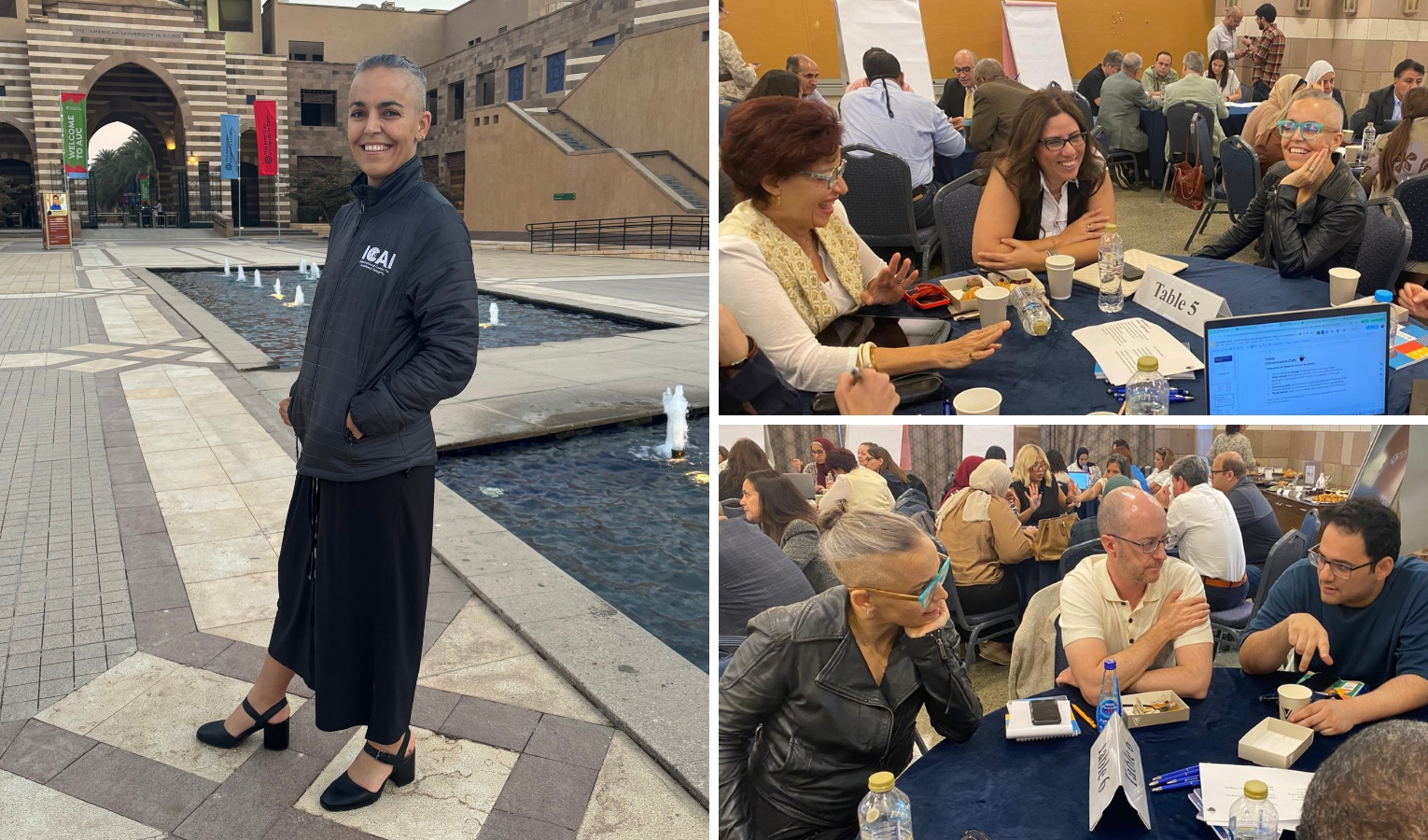
An Expert’s Take on GenAI and Academic Integrity
The generative artificial intelligence (genAI) boom has changed and challenged student learning around the world. As universities grapple with the rise of genAI, questions of integrity remain at the forefront.
AUC partnered with the International Center for Academic Integrity (ICAI) to host a three-day professional development program for faculty and staff on academic integrity. The collaboration is part of the University’s efforts to enhance an institutional culture of academic integrity.
Organized by the Office of the Provost and facilitated by the Center for Learning and Teaching, the program featured a roundtable discussion on “Crucial Conversations Around Academic Integrity and Student Learning in the Age of GenAI.” Greer Murphy, director of the Academic Integrity Office at UC Santa Cruz as well as board member and vice president for strategy at ICAI, led the discussion.
“There is a lot happening in the world that has heightened the importance for any institution of higher education being able to demonstrate not just how it guides, but how it certifies the authenticity of a student's learning processes and protects the value of the degrees it offers,” Murphy says.
News@AUC spoke with Murphy to provide further insights on the future of academic integrity and generative artificial intelligence.

Greer Murphy led roundtable discussions on academic integrity and student learning during AUC's Professional Development Program on Academic Integrity.
“There is a lot happening in the world that has heightened the importance for any institution of higher education being able to demonstrate not just how it guides, but how it certifies the authenticity of a student's learning processes and protects the value of the degrees it offers."
Can you tell us more about ICAI and AUC’s collaboration?
As our name suggests, the mission of the International Center for Academic Integrity is to connect with different organizations around the world, primarily educational institutions, who are interested in promoting what we’ve identified as six fundamental values of academic integrity: honesty, fairness, trust, respect, responsibility and courage.
Broadly speaking, AUC has been a contributing member of ICAI for quite some time. Professor Mohamed Abou-Zeid served as director back when we were affiliated with Clemson University, and Marwa Gaafar, director of AUC’'s Office of Academic Integrity, volunteers on several committees. So we are working together through that partnership and this site visit to further collaborate and deepen the work AUC as an institution is doing to put fundamental values into practice in its teaching and learning, academic integrity, and suspected misconduct resolution processes.
We’re starting with facilitated program evaluation/benchmarking workshops, and I’m excited to see where our partnership might grow from there.
How has generative AI changed — or challenged — student learning?
"But in the big picture, I see genAI as part of the higher-ed landscape in the long term. Institutions must figure out ways to verify learning and teach students how to use these technologies ethically and responsibly."
I like to talk about academic integrity as being practiced on three levels. An institution such as AUC sets an ethical foundation in its baseline policy (1). Then it’s essential for faculty to build on that foundation by setting and maintaining expectations that make sense in the courses (2) and assignments (3) they teach. Clear, consistent communication across all three levels remains incredibly important, and the rapid onset of genAI has really challenged that.
There are a lot of really interesting possibilities for learning differently and potentially learning “better” with genAI. I'm definitely not of the mindset that artificial intelligence will always make us dumber, will automatically lead to cognitive offloading, or should automatically be prohibited. I do think strongly constraining the use of genAI in some classes in light of certain learning objectives students need to demonstrate does make good pedagogical sense.
But in the big picture, I see genAI as part of the higher-ed landscape in the long term. Institutions must figure out ways to verify learning and teach students how to use these technologies ethically and responsibly. And when that happens, I think there's great potential for building on some of the capacities that genAI promises to give us.
What new challenges to academic integrity have arisen since the generative AI boom?
"With genAI, the nature of judging certainty, the nature of investigation and the nature of following up on suspicions of potential misconduct, get so much more tricky."
In many ways, I see these challenges as representing differences of degree–not so much of kind. Students are humans; humans have always made mistakes when it comes to practicing integrity, academic or otherwise. Hopefully, as much as possible, students who cheat — who make integrity mistakes — have been provided ways to learn from those mistakes and go on to success, both in their remaining time at university and throughout their careers.
That said, with genAI, the nature of judging certainty, the nature of investigation and the nature of following up on suspicions of potential misconduct, get so much more tricky. And it was already tricky.
Academic integrity is often viewed in punitive terms. What other frameworks can be used to address issues of academic integrity?
The most common counterpart to punitive is restorative. What restorative measures and pathways has an institution put in place to help you not just learn and grow from a misconduct incident, but also demonstrate learning and growth so that you can go on to a successful career?
Moving from punishment to restoration is a pretty common way of talking about where we want to go with integrity work. It's not the only way to talk about it, though. I also like authenticity as a lens—verifying the authenticity of a student’s learning as having been true and transparent, an accurate representation of what the class listed on their transcript says they know and can do.
"How can we have confidence that society can trust a student to be able to do the things their diploma says they can do?"
If you have a choice to go to a doctor who you know did all of their work honestly and didn't get quite as high a board score as someone else who maybe didn’t do it all themselves—I'm going to the honest person. I don't care if the board scores were lower, they did all the work themselves rather than someone who took shortcuts to achieve a prestigious outcome. If I know, I'm going to choose the one with the more authentic certification. As I think most of us would.
And how can we verify the authenticity? How can we have confidence that society can trust a student to be able to do the things their diploma says they can do? Nobody wants a bridge built by someone who doesn't know how to build bridges because they got a little bit too much help while doing their degree. So restoration and authenticity, I think are two more honest and more productive framings than focusing only on okay, ‘you made a mistake.’ Because we all make mistakes, right?
What can universities like AUC do to promote academic integrity during the genAI boom?
Universities like AUC can do what we should have been doing all along: incorporate student perspectives while thinking about integrity as a responsibility shared amongst all stakeholders, academic and administrative staff included.
"Talking at rather than talking with is going to lead to less sustainable and authentic outcomes, rather than if there’s that true exchange."
Trying to do academic integrity work without using student voice and perspectives will never work as well as when an institution accounts for that throughout the entirety of the process. Talking at rather than talking with is going to lead to less sustainable and authentic outcomes, rather than if there’s that true exchange. So, empowering faculty with time, space, and support to develop their teaching practice to encourage integrity, but above all finding structured ways to honor student voices and really seriously incorporate their feedback into processes and policy will serve an institution well regardless of the challenges that lie ahead.
